China's Bunker Exports Nosedive
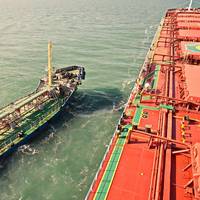
China's exports of marine fuel in March plunged 15% from a year ago, customs data showed on Wednesday, hit by high prices and COVID-19 curbs at domestic ports.March shipments were 1.42 million tonnes, data from the General Administration of Customs showed. Most of this was very low-sulphur fuel oil (VLSFO), with a maximum sulphur content of 0.5%, to meet the emission rules of the International Maritime Organization.The volume was up from 1.31 million tonnes in February but was…
New Vessel Launched for Gulf of Guinea Security Ops
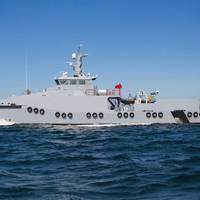
A newly launched multipurpose vessel is destined for for the Gulf of Guinea where it will be utilized for international oil company (IOC)-related assignments as well as escort patrols for larger vessels that have experienced an escalation of pirate attacks within 200 nautical miles of the West African coastline.The new flagship of shipbuilder and maritime services provider Nautic Africa, the 35-meter vessel is the second in the Sentinel class, fully compliant to the standards…
Oman Signs Djibouti Code of Conduct
Oman has become the 16th signatory to the Jeddah Amendment to the Djibouti Code of Conduct – the instrument developed and adopted by countries in the Western Indian Ocean and Gulf of Aden that has been a key factor in repressing piracy and armed robbery against ships operating in that region.Comoros, Djibouti, Ethiopia, Jordan, Kenya, Madagascar, Maldives, Mauritius, Mozambique, Oman, Saudi Arabia, Seychelles, Somalia, United Arab Emirates, United Republic of Tanzania and Yemen are other 15 countries.The Amendment significantly broadened the scope of the Djibouti Code when it was adopted at a high-level meeting in Jeddah, Saudi Arabia in January 2017.It covers measures for suppressing a range of illicit activities…
Hapag-Lloyd on 2020 Low Sulphur Fuel
LSF2020 refers to the new “Low Sulfur Fuel” regulations, which will come into effect on 1 January 2020.These regulations are the biggest of a series of steps by the International Maritime Organisation (IMO) to reduce marine pollution (MARPOL) in response to the threat of climate change.The LSF2020 emission regulations mean ships will have to significantly reduce emissions on the high seas as well as in coastal areas. This change does not only concern Hapag-Lloyd but it challenges the entire shipping industry. The good news is however: Thanks to the regulations, the industry will become much greener.Now, the question is how to comply with the new regulations and how much it will cost.
Mauritius Signs Jeddah Amendment on Illicit Maritime Activity
Mauritius has become the 15th signatory to the Jeddah Amendment to the Djibouti Code of Conduct – the instrument developed and adopted by countries in the Western Indian Ocean and Gulf of Aden that has been a key factor in repressing piracy and armed robbery against ships operating in that region.The Amendment significantly broadened the scope of the Djibouti Code when it was adopted at a high-level meeting in Jeddah, Saudi Arabia in January 2017.It covers measures for suppressing a range of illicit activities, including piracy, arms trafficking, trafficking in narcotics, illegal trade in wildlife, illegal oil bunkering, crude oil theft…
Ghana Ready For Maritime Crisis
From the sinking of the Titanic to the current piracy phenomenon plaguing the world's oceans, Maritime challenges requires a conserted and collaborative global effort at maintaining safety of live and protection of property at sea.To this the Ghana Maritime Authority (GMA) collaborated with its global partners from the European Uninon Gulf of Guinea Interregional Network (EU-GoGIN), and the Inter-Regional Coordination Centre (ICC) and organized a four-day crisis response training for security experts and players in the maritime sector.Participants were drawn from the Ghana Maritime Authority, Ghana Army, Ghana Navy, Airforce, National Security, National Disaster Management Organisation and Ghana Immigration Service.
Singapore to Require Flow Meters for Bunker Transfers
Singapore's Maritime Port Authority (MPA) is set to announce it is making use of mass-flow-meters (MFM) mandatory onboard marine gasoil barges used to refuel large ships, two people with knowledge of the matter said. The announcement will be made at a gala dinner in the city state organised by the International Bunker Industry Association (IBIA) later on Thursday, the people said. They spoke on condition of anonymity because they were not authorised to speak to the media. It wasn't immediately clear from which date the MPA will enforce the use of MFMs - designed to minimise inaccuracies and errors in measuring quantities delivered - on gasoil bunker barges. The people with knowledge of the matter said the date was likely to be either Jan. 1 or July 1 next year.
SEA\LNG Rolls Out LNG Bunkering Navigator Tool
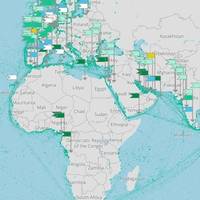
A new free-to-access online tool aims to improve understanding of the current, and rapidly evolving, bunkering infrastructure landscape for liquefied natural gas (LNG). Launched by industry coalition SEA\LNG from the sixth LNG Bunkering Summit currently taking place in Amsterdam, the new Bunker Navigator Tool utilizes member, marine information services and publicly available data to provide access to the latest developments in the global LNG bunkering infrastructure. SEA\LNG’s map-based tool…
Somalia Signs on to Combat Piracy
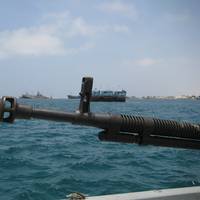
Somalia has become the latest to sign the Jeddah Amendment to the Djibouti Code of Conduct, developed and adopted by countries in the Western Indian Ocean and Gulf of Aden that seeks to repress piracy and armed robbery against ships operating in the region. Adopted in January 2017, the amendment broadened the scope of the Djibouti Code, covering measures for suppressing a range of illicit activities, including piracy, arms trafficking, trafficking in narcotics, illegal trade in wildlife…
Catfines: Uncertainty Must Be Addressed
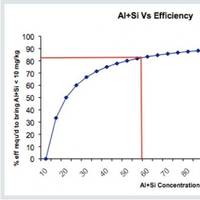
Earlier this year the International Organization for Standardization (ISO) published a revised edition of its ISO 8217 specifications for marine fuels, which still maintains a 60 mg/kg limit for catfines (catalytic fines). It’s not rare to hear comments about this threshold being on the high side. A recent test conducted by the Fuel Oil Bunkering Analysis and Advisory Service (FOBAS) takes the debate to a new level. It shows that a number of bunker samples delivered in Fujeirah…
Kenya Signs Maritime Piracy Agreement
Kenya has become the 13th signatory to the Jeddah Amendment to the Djibouti Code of Conduct – the instrument developed and adopted by countries in the Western Indian Ocean and Gulf of Aden that has been a key factor in repressing piracy and armed robbery against ships operating in that region. Comoros, Djibouti, Ethiopia, Jordan, Kenya, Madagascar, Maldives, Mozambique, Saudi Arabia, Seychelles, United Arab Emirates, United Republic of Tanzania and Yemen are other countries to sign it. The Amendment significantly broadened the scope of the Djibouti Code when it was adopted at a high-level meeting in Jeddah, Saudi Arabia in January 2017.
Maritime Security in Western Indian Ocean
The key International Maritime Organization (IMO) instrument helping to repress piracy and armed robbery against ships in the Western Indian Ocean and the Gulf of Aden – the Djibouti Code of Conduct – is part of discussions at an international conference in Morocco. The West African Coastal Surveillance and Maritime Security Summit 2017 (AFSEC 17), being held in Casablanca (30 May – 1 June) has heard IMO’s Chris Trelawny present the latest developments of the Code, which is part of IMO’s on-going maritime security work. Mr. Trelawny gave an insight into the recently adopted Jeddah Amendment to the Djibouti Code. The Amendment includes measures for suppressing a range of illicit activities.
Training for Maritime Law Enforcement in ME
A three-week training course on maritime law enforcement for the Middle Eastern countries surrounding the Gulf of Aden concluded May 4 in Jeddah, Saudi Arabia. The course brought together specialists from 14 signatory countries* to the Djibouti Code of Conduct – the IMO instrument helping to repress piracy and armed robbery against ships in the Western Indian Ocean and the Gulf of Aden. Participants covered topics covered under the recently adopted Jeddah amendment to the Djibouti Code – such as how to suppress a range of illicit activities. These include piracy, arms trafficking, trafficking in narcotics, illegal trade in wildlife, illegal oil bunkering, crude oil theft, human trafficking, human smuggling, and illegal dumping of toxic waste.
SE Asia Accounts for More than Half of the World’s Piracy Attacks
At present more than half of the world’s piracy attacks are occurring in South East Asia, says he latest International Maritime Bureau (IMB) incident report. Piracy in the Gulf of Aden, which was the scourge of global shipping from 2011-14 has all but disappeared. But the problem is far from solved, whilst global piracy has dropped overall in the past few years the start of 2015 has seen a consistent rise in attacks. Responsible for this increate are both the Gulf of Guinea, which remains a hotspot for armed robbery at sea and kidnap for ransom, and south east Asia. Piracy in the waters off Indonesia, the Malakka and Singapore Straights has risen almost exponentially, representing almost 40 per cent of 2015 attacks globally. The majority of these incidents related to illegal oil bunkering.
Singapore Bunker Meter Mandate Targets 'Frothy Fuel'
Singapore, the world's biggest bunkering port, plans to end the so-called "cappucino effect" in ship fuelling through new meters designed to stop suppliers from short-changing customers, although the industry is warning of a short-term sales dip. The Maritime and Port Authority (MPA) of Singapore, which sold more than 42 million tonnes of bunker oil in 2013, will be the world's first port to mandate the use of mass flow meters for fuel oil bunkering. The meters show the actual mass of fuel delivered, preventing suppliers from boosting their profits by injecting air into the fuel as it is pumped aboard. The practice, known as the "cappucino effect"…
Super Slow Steaming – Bunker Sales Down
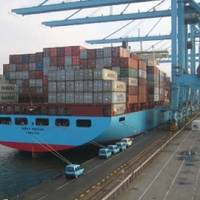
The Port of Rotterdam reports 2012 fuel oil bunker volume fell from 11.6 to 10.3 million tonnes. The Port of Rotterdam Authority attributes the decline as a whole to the more efficient way of sailing adopted by shipping (‘super slow steaming’). However, gas oil bunkering increased slightly; from 530,000 to 550,000 tonnes. Container vessels account for almost half of the close on 23,000 bunkers sold and three-quarters of the total quantity of fuel oil bunkered. Container shipping sails more efficiently nowadays…
USTC Companies Announce New Board of Directors

Experienced shipping and finance professionals in new board for USTC companies. One of the biggest and fastest expanding companies in Denmark, A/S United Shipping & Trading Co Ltd. headquartered in Middelfart, is strengthening its organization with a new board of directors who will also take up positions in its subsidiaries Bunker Holding A/S and Uni-Tankers A/S. The composition of the board aims to encompass the expertise required to enable the parent company and its two shipping related subsidiaries to further develop in a difficult market.
Nigerian House Navy Committee Tackles Illegal Bunkering
Illegal oil bunkering is one of the many problems militating against the smooth running of the oil industry in Nigeria. This problem has been acknowledged by the House of Representatives Committee on Navy, which was recently inaugurated by the Speaker, Hon. (Mrs) Patricia Olubunmi Etteh. Beginning almost five decades ago, the House of Representatives Committee on Navy, has been fighting illegal oil bunkering. Hon. Adamu in his address at the occasion lamented the colossal sums of money being lost, estimated at almost $2m a day, by the country to the activities of illegal bunkering in the sector. According to Adamu, his committee would take a dispassionate look at the Navy Act of 1964…
Navy Releases Two Ships to Owners
The Nigerian Navy handed over two ships arrested for oil bunkering in 2003 on the order of the presidency following a court ruling, according to a report on AllAfrica.com. But the Flag Officer Commanding (FOC), Western Naval Command , Commodore John Kpokpogri who handed over the ships - Mt Tina and Mt Glory on behalf of the Chief of Naval staff (CNS), Vice Admiral Ganiyu Adekeye gave the owners 24 hours to remove the ships from the territorial waters or face the full weight of the law. Kpokpogri made it clear to the ship owners, Petrostar Shipping Company that the Navy, in fulfilling its statutory function, would still arrest the ships if found to be engaging in unwholesome activities.





